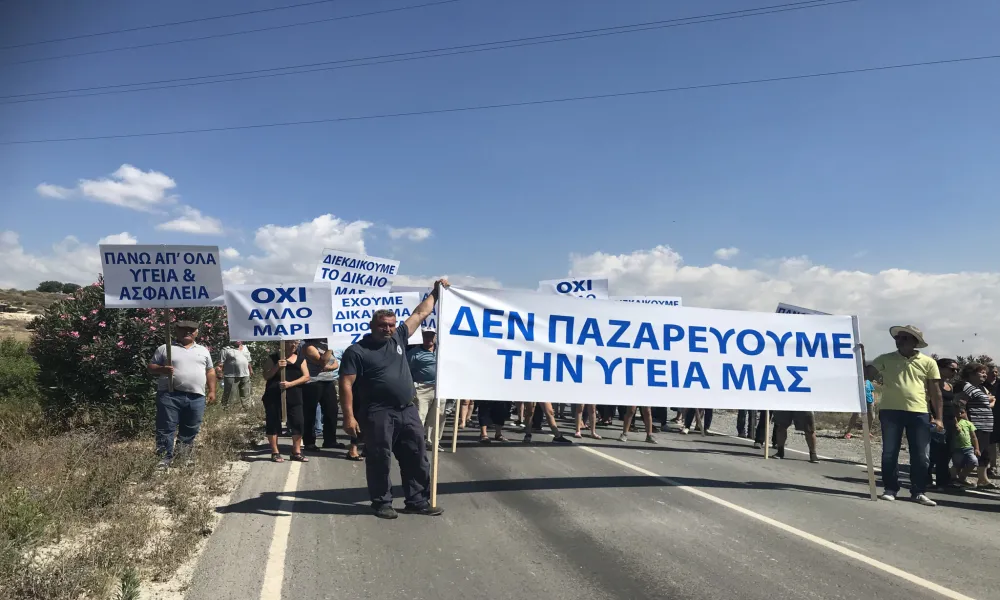Local leaders in the Vasiliko area say the balance between industrial development and environmental protection has been lost, warning of growing anger among residents of the nine affected communities.
Klavassos community leader Konstantinos Sozos accused the state of “decades of continued inaction” and a “complete lack of accountability,” warning that frustration could soon spill over into a “popular explosion.”
From his side, the director of the Department of Environment, Theodoulos Mesimeris, acknowledged that the heavily industrialised area - home to energy plants, quarries, cement works and waste facilities - requires “immediate action and enforcement of the legal framework.” He confirmed that air quality measurements and an epidemiological studyare underway.
Both men, speaking to Politis, agreed on the need for concrete measures to restore environmental balance in Cyprus’s most burdened industrial zone.
'Kalavassos has become Cyprus’ dump'
Sozos pointed to the state waste management facility at Pentakomo (OEDA), located near the borders of Klavassos, as a symbol of systemic failure. “It was a project that never operated as designed,” he said. “Infrastructure was built but never properly used - it became a landfill rather than a complete waste management system.”
He accused the state of focusing only on where to move problems rather than how to solve them. “Whenever something is transferred to the Vasiliko area, it’s automatically considered safe,” he said.
256 illegal dumpsites
Efforts to clean up 256 illegal dumpsites around Klavassos and Pentakomo have stalled, leaving local ecosystems exposed and tensions rising. Meanwhile, the burning of tyres at the cement plant continues to add to the area’s pollution load.
Sozos warned that the nine communities - representing roughly 7,000 residents - are preparing legal action “both within and outside Cyprus” if the situation continues to deteriorate.
Fire and ammunition hazards
The community leader recalled a major fire in 2022, when piles of used tyres were transferred from Dali to Vasiliko before igniting. “Instead of being neutralised, the bomb was simply moved elsewhere to explode,” he said.
He cited another example from 2012, when thousands of old munitions stored in Palodia after the deadly Mari explosion were transferred to Asgata without adequate study. “Fortunately, that bomb did not go off,” he said, noting that over 120,000 ageing shells were eventually destroyed.
Gas storage safety concerns
Sozos also criticised the placement of LPG and fuel storage facilities in flood-prone areas. “The LPG plant sits in a valley by a riverbed - a high-risk location for both flooding and ignition,” he said.
He added that unlike Larnaca, where LPG unloading took place offshore, in Vasiliko the process occurs inside the closed port, creating additional safety risks. “Decisions are not guided by what and how - only by where,” he warned.
Problems acknowledged, solutions underway
Mesimeris confirmed that “a concentration of industrial and energy activities” has created conditions for “environmental degradation,” but said authorities are now “acting to reverse” years of poor management.
The contract with the private operator of the Pentakomo facility was terminated, and the Agriculture Ministry has assumed temporary management.
A new plan is being implemented in phases, including:
-
restoration and reactivation of the biological treatment plant,
-
upgrading of the mechanical sorting unit, and
-
rehabilitation of landfill cells.
“At the moment, waste is only partially sorted and then buried - this must change,” Mesimeris said, noting that EU rules limit landfilling to 10% of total waste.
Gas leak checks and health study
Following resident complaints about odours from LPG facilities, the department has commissioned an independent laboratory to test for potential gas leaks, with results expected by end-November.
At the same time, an epidemiological study is being carried out with the Health Ministry. “We’re collecting primary air quality data and linking it with public health indicators,” Mesimeris said. The first results are expected in 2025, with completion in 2026.
He added that the department is now assessing cumulative environmental impacts, rather than approving new projects in isolation - a shift that has already led to the rejection of two out of three asphalt plant applications in the Klavassos area.
Five 'burdened zones' under review
The Department of Environment is also expanding its assessments to five heavily impacted regions of Cyprus:
-
Klavassos–Pentakomo–Vasiliko,
-
Dali industrial area,
-
Agios Silas industrial area,
-
Paphos landfill at Agia Marinouda, and
-
Kato Moni in Nicosia, due to intensive livestock activity.
Inspectors have been instructed to evaluate entire areas, not just individual facilities, and to prepare an environmental monitoring plan with both preventive and restorative measures.
